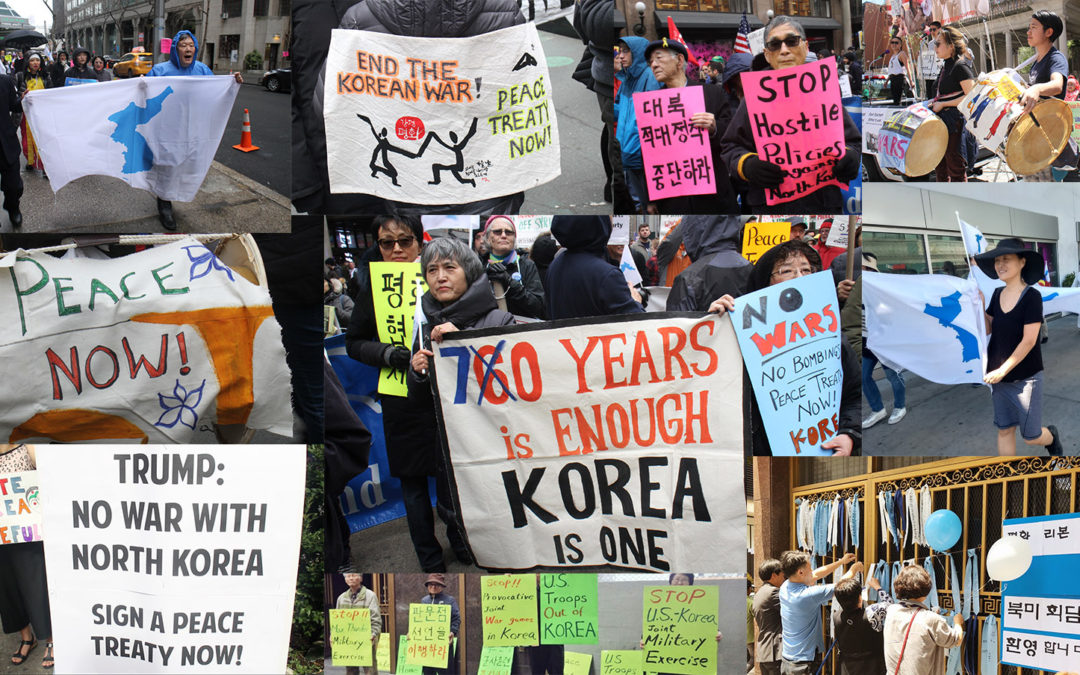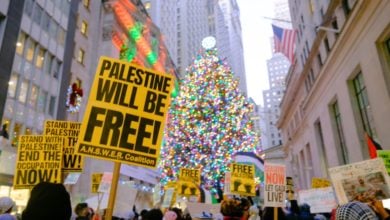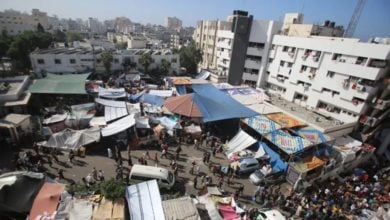
There has been much publicity recently about a struggle for justice and compensation waged by so called “comfort women”—women and girls from Korea and other nations occupied by Japan–who were trafficked and held as sex slaves for Japanese soldiers during World War II. Few know, however, that this same sexual trafficking and sexual slavery system was then used to “comfort” the new occupiers of Korea since 1953—the U.S military, and that this sexual exploitation was co-managed by the U.S. and South Korean governments.
This atrocity, which included forced STD treatment in detention centers, has been brought to light by a historic suit recently won in a Korean court by some of the aggrieved women, kijichon halmonis (“camp town grandmothers” or “comfort women”). These victims of military violence have demanded an apology and reparations. The suit reveals that for more than six decades, the U.S. and South Korean have together co-managed the sexual trafficking and even sexual slavery, of tens of thousands of Korean women and girls in special camp towns near U.S. bases in south Korea.
There women who have worked on the suit were in New York City recently explaining the legal action and its ramifications. They seek not only to get the word out, but also to connect with U.S. lawyers to find way to file suit here, to demand reparations for the Pentagon’s role in sex trafficking and military violence against women.
Women say they were ‘sold’
Eun-Jin Kim, from Durebang (My Sisters Place) which advocates for the kijichon halmonis, described life for trafficked women in the “camp towns,” commercial facilities for U.S. soldiers containing bars, clubs and women. In explaining how they got to the camp towns, the women, “always” use the word “sold” to “emphasize their of lack of volition, and that they were no longer treated as a person, but as merchandise,” Kim said.
Many of the women were used for sex at an early age, she explained. One was sold as a child to a camp town “for 3 bowls of noodle soup.” Another, the daughter of a poor family, was working as a live-in maid, when she was “sold by that family to a camp town and trafficked.” Many were told that their forced sexual servicing of occupying U.S. soldier was “patriotic,” because it brought in revenue to South Korea. Others were told that they were “working for national security.”
Concern was for health of GIs, not the trafficked women
A key issue in the suit, said Kim, was “forced STD exams” as part of a “government-managed policy” to “keep camp town women free of sexual transmitted diseases for the health of the U.S. soldiers.”
The women “had to carry up-to-date health certificates. For underage girls, the ID would be forged.” If their health certificate was not up to date they were sent to STD detention centers. If a soldier had an STD, he was asked to identify the women who infected him. Women were often misidentified. Many of the women detained were given penicillin shots without being tested to see if they actually had STDs. “The shots would sometimes lead to convulsions, paralysis on one side. This increased the horror of detention,” said Kim.
The women are bitter that there was no concern for their overall health, or any other health issues that they might have. The only concern was over the health of their sexual parts, so U.S. soldiers would not catch a disease.
There were also many murders of these trafficked women and girls. Few of the perpetrators were brought to justice, Kim explained. Local authorities and the Korean government “systematically neglected and dismissed these women and their complaints.”
Today, many of the survivors of sexual trafficking are in poor health, financially struggling and in need of a lot of support. Also causing them pain was the fact that “there was no public acknowledgement or public redress for the multi-generational violence against women.” In 2008, some stepped forward, agreed to sue the government for what it had done to them,and began providing their histories.
The suit covers what was done to Korean women from the 1950s through the 1980s. Kim explained that the camp towns are still there and today, a majority who work and are trafficked there are migrant women, mostly from the Philippines. There is no longer forced STD detention, she said “but the structure of exploitation remains.” My Sisters Place helps these migrant women with medical costs, psychological recovery, job training, and provides job services for them to return home.
U.S.-Korea governments managed sex trafficking for six decades
Jeon-Mi Park, an expert witness in the suit, detailed the history sex for sale as managed by the U.S. and South Korean governments. From 1950-53 there were 340,000 foreign troops, in Korea, 90 percent from the U.S., she said. These troops divided Korean in half against the will of its people, with the Pentagon being the “inheritor of the Japanese occupation.” The U.S. saw the “necessity to provide safe sex to [its] soldiers” and “Korean officers were already familiar with comfort station system”used by the Japanese occupiers. This system was continued for U.S. soldiers, with “the U.S. advising the program established and overseen by the [South] Korean government.”
As the years passed, the “comfort stations” became known instead as “special restaurants.” They were “all brothels under different names.” Between the end of the Korean War in 1953 and the 1980s “Ten thousand women registered as sex workers annually.” This was “just for GIs” and just at camp towns, which “also served as a buffer zone between the U.S. troops and Koreans, so there wouldn’t be conflict between them.”
The “U.S. intensified its control over the selling of sex to U.S. servicemen as time passed. In 1950s, Park said, this task was delegated to the South Korean government, with the U.S. mostly limited to giving medication to the women for STDs. In the 1960, Park continued, the “U.S. stepped up effort to control STDs among Korean prostitutes because STDs remained high,” and further increased control of the women in the 1970s. In 1965 the Korean government began opening quarantine stations.
Comfort women had to wear badges with their names written in English. U.S. bases had photo files of comfort women.
The law suit
Ju Hee Ha, an attorney for the women, explained that a South Korean appeals court ruled in favor of the plaintiffs in January. They are now awaiting a Supreme Court decision, and are hopeful.
This ruling was the first Korean state acknowledgment of some of the crimes it committed against women. The ruling orders compensation to some, but not all of the 115 plantiffs. While the lawsuit was not a complete victory on behalf of sex workers in camp towns or even of all of the women in this suit, it opens the door to more such actions, and began a broader conversation on accountability in and around U.S. bases.
The suit maintains, Ha said, that South Korean government officials actually managed prostitution, as it was called then, violating the law and failing to respect and protect the human rights of the women. According to Ha, “There is no question that the South Korean government encouraged this”; that the “camp town industry was created by the U.S. and [south] Korean governments together”; that these governments “systematically managed the women”; and that “both governments worked together on all aspects of this.” In addition, forced STD treatment violated the women’s bodies and their human rights.
Ha also maintains that the “U.S. considered it a part of their military itself,” and “encouraged and justified sex work in the camp towns” in order to “manage their own soldiers.”
Ha wants to hold the U.S. government accountable. She pointed out that this will be a difficult process, as Washington maintains it can’t be held responsible for illegal actions committed abroad.
Progressives have every reason to support and assist them in bringing the Pentagon to justice. At the same time, what Washington has done to the women of Korea is yet another compelling reason to demand that the U.S. get out of Korea, end the military occupation of that sovereign nation, and let the Korean people reunite their country and determine their own fate.
The event was sponsored by Asian American Feminist Collective; Asian American Political Activism Coalition at NYU; Asian/Pacific/American Institute at NYU; and Rutgers Global. It was endorsed by Channing & Popai Liem Education Foundation; Veterans for Peace – NYC Chapter 34; Peace Action NYS; ANSWER Coalition (Act Now to Stop War and End Racism)NYC; and BAYAN USA






